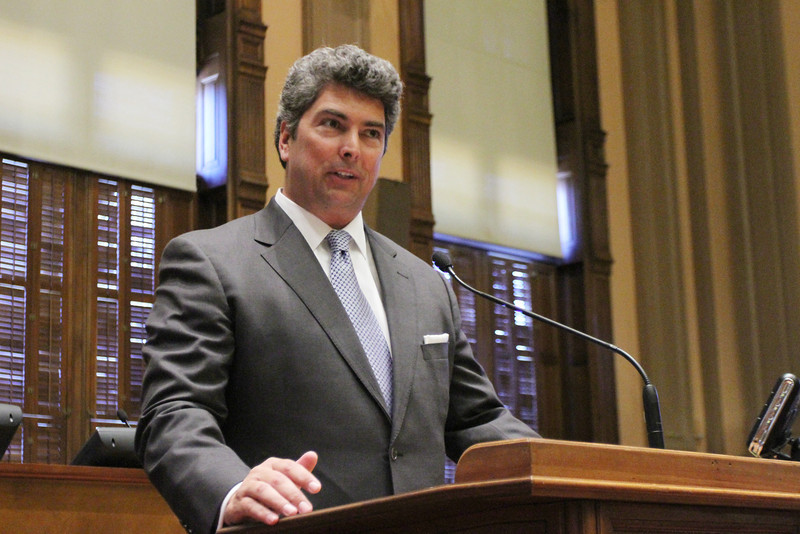
Georgia Court of Appeals Judge Mike Boggs, co-chair of a special council on criminal justice reform says of juvenile policy: “We’re not at the point of drafting anything yet. We’re still assimilating and gathering data, system driver data.” Photo courtesy of Georgia House of Representatives
With technical assistance from the Pew Center on the States, a Georgia blue ribbon panel is studying the state’s juvenile criminal justice system, charged by the governor with recommending policy changes.
“We’re not at the point of drafting anything yet. We’re still assimilating and gathering data, system driver data,” said state Court of Appeals Judge Mike Boggs, co-chair of the Special Council on Criminal Justice Reform.
The 21-member council of mainly judges and attorneys was renewed by Governor Nathan Deal earlier this year to study and recommend policy for both the adult and juvenile justice systems.
Boggs was speaking at the end of the latest in a series of juvenile justice presentations by the Pew Center on the States, this time focusing on recidivism.
Pew says its data suggests the best programs to fight recidivism find and focus on the most at-risk kids.
“When we talk about looking at what’s going to reduce likelihood of reoffending, we want to look at the things that are targeting the higher risk offenders for correctional intervention. That really is going to maximize our impact on recidivism reduction,” said Kristy Danford, project manager at the Crime and Justice Institute, Pew’s partner in the Georgia study.
Danford compared studying recidivism risk to studying heart attack risk. Someone with high cholesterol and a fatty diet is likelier to end up in the emergency room just as a youth with dodgy friends and a prior record is more likely to end up in a courtroom.
Yet data suggest an uneven approach to keeping kids from returning to state custody across Georgia’s courts and jurisdictions.
Not all jurisdictions are trying to diagnose recidivism risk in the same ways, nor is it clear how consistently decision-makers such as judges use their discretion.
“While there may be standards in place, the extent to which they’re adhered to is not known,” said Danford. Besides that, funding varies in different jurisdictions, so the menu of services varies too.
Youth in custody do not necessarily get treatment for their specific problems, like life skills or anger management, because the state’s detention centers do not necessarily all offer every service.
And in the state’s regional youth detention centers, kids of all risk levels mix. That is, kids who are generally at low risk of reoffending might meet up with new, dodgy friends.
Pew’s Jason Newman explained that they’re not making policy recommendations, only providing technical assistance. “We’re still looking at data to find challenges and opportunities,” he said.
Smaller work groups of committee members will study pieces of data and report their findings to the full council in the coming months. A full council report is expected by the end of the year. Any or all of its recommendations could be written into bills for the 2013 Georgia legislative session.
“I expect it would legislatively be a separate piece of legislation,” Boggs said. A massive juvenile justice code rewrite that’s been in the works for several years “will continue to proceed under its ordinary course. Only to the extent that we make policy recommendations that somehow impacted that would they consider amending that bill to include it,” he explained.
Georgia has drafted legislation in that way before. In 2011, a blue ribbon panel studied, then recommended wide tax changes. Legislators picked a few recommendations that made their way into bills in 2012 and later into state law.

“Smaller work groups of committee members will study pieces of data and report their findings to the full council in the coming months.”
I’m curious if anyone has information on what the focus and membership is of each of the individual working groups.
“Smaller work groups of committee members will study pieces of data and report their findings to the full council in the coming months.”
I’m curious if anyone has information on what the focus and membership is of each of the individual working groups.
Thanks!